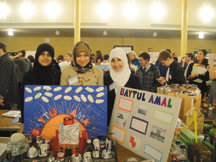Hundreds of America’s future leaders – including several from Union City – descended upon Rutgers University last Saturday to talk about what health care will look like in the future.
This year marked the 19th year of the Future City Competition sponsored by the National Engineers Week Foundation, a formal coalition of more than 100 professional societies, major corporations, and government agencies that promote engineering and technology-geared career paths for younger students.
More than 33,000 students from 1,000 middle schools in 35 regions across the country participate in the regional competitions each year.
“You just have to be confident in yourself. Everybody is nervous just like you.” – Sohira Idrees.
________
Despite losing out to first place winner Valley Middle School in Oakland, N.J., Rising Star’s nine participating students gained a working knowledge of engineering and health care issues.
The competition
Teams start by submitting a research essay describing their concept and a City Narrative outlining the key features of their city.
This year, with the introduction of “Obamacare,” participants tackled the theme, “Providing a Reliable and Effective Health Care Product or System That Improves a Sick, Injured, or Disabled Patient’s Quality of Life and Comfort.” Each city had to develop a system that would support diagnosis, treatment, monitoring, and rehabilitation, all while adhering to strict technical and ethical standards.
First place winners from each regional competition will travel to the national competition February in Washington D.C. to vie for prizes. The grand prize is a visit to U.S. Space Camp in Huntsville, Ala. The second place prize is $5,000 from the foundation, and the third-place prize is $2,000 from IEEE-USA for the school’s technology programs.
Combating health issues through design
Under the supervision of Rising Star Academy Principal and ninth grade biology teacher Hala Shehadeh, three teams of three students participated.
Starting in September, the students spent countless hours after school and on weekends learning engineering concepts from a mentor engineer, Ihab Shafei of the Metropolitan Transit Authority, and developing a layout of medical facilities that would best serve patients afflicted by heart problems, mental health issues, or diabetes.
Eighth grader Sohira Idrees, who had competed before, was tasked with researching and devising infrastructure to best treat patients with coronary heart disease.
Like members of other New Jersey teams, she presented her 3-D model, made with less than $100 in recycled materials, at the regional competition on Saturday. Judges critiqued her design and tested her and her team’s depth of knowledge concerning their designs.
“You get nervous [when you get to the competition],” Idrees said, “but you just have to be confident in yourself. Everybody is nervous just like you.”
A rewarding experience
Idrees’ team did not ultimately place, but she gained insight into her interests and a possible future career path. As a science and math-oriented student of a family steeped in the medical field, she believes her experience helped strengthen her desire to work as a dermatologist.
Engineering, she said, is more of a “hobby.”
Participants in past years have received patents for their designs, while others have been recognized by national engineering societies.
Deanna Cullen can be reached at dcullen@hudsonreporter.com.
